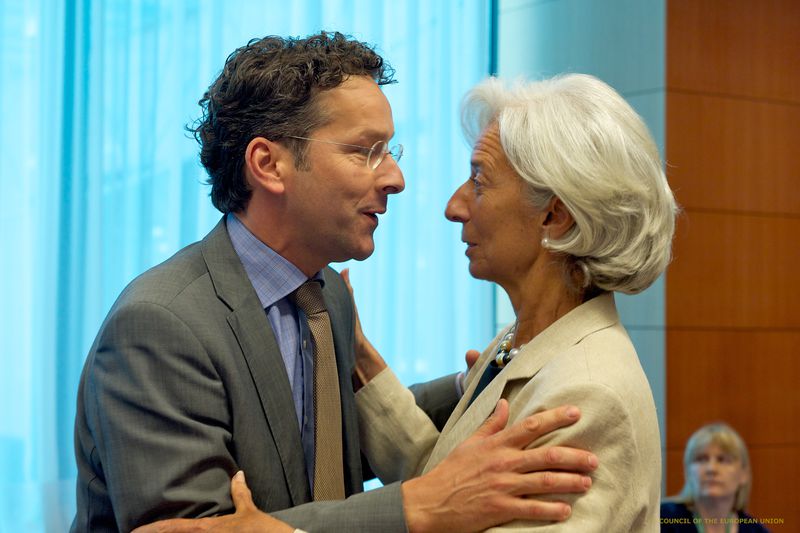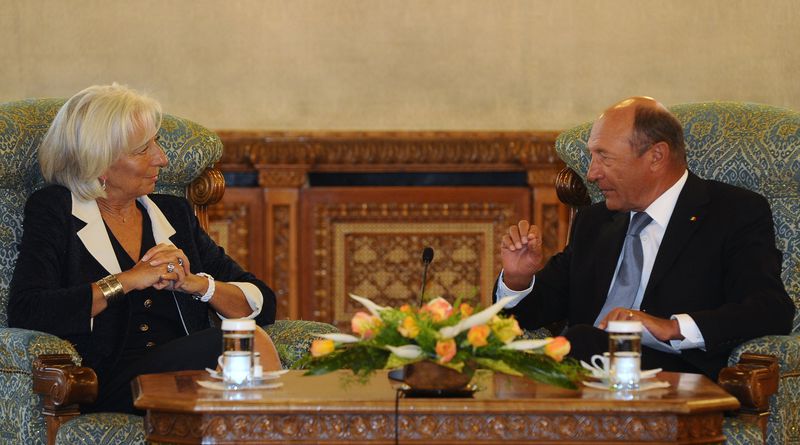IMF Again Turns toward Eastern Europe
Adelina Marini, July 19, 2013
 Against the backdrop of the debate about crises, defaults, for or against austerity measures, about the good and bad examples, the International Monetary Fund again thought about Central and Southeastern Europe and the experience the countries from that region have from the beginning of the 1990s of the past century, but also from the global financial crisis. According to the Fund, the region still has a potential for development, but its dependence on western financial flows still is huge. This dependence could be mitigated to a large extent by the establishment of a full fledged banking union in the EU. It is time to move from a survival regime toward a prosperity regime, Christine Lagarde, IMF's managing director, said in a speech dedicated to the future of Central and Southeastern Europe (CSEE). That can be achieved in only one way - reforms and more European integration.
Against the backdrop of the debate about crises, defaults, for or against austerity measures, about the good and bad examples, the International Monetary Fund again thought about Central and Southeastern Europe and the experience the countries from that region have from the beginning of the 1990s of the past century, but also from the global financial crisis. According to the Fund, the region still has a potential for development, but its dependence on western financial flows still is huge. This dependence could be mitigated to a large extent by the establishment of a full fledged banking union in the EU. It is time to move from a survival regime toward a prosperity regime, Christine Lagarde, IMF's managing director, said in a speech dedicated to the future of Central and Southeastern Europe (CSEE). That can be achieved in only one way - reforms and more European integration.
While Ms Lagarde was doing her speech un Bucharest that echoed throughout the region, in the same time European Commission Vice President Viviane Reding was preparing her article for the Bavarian daily Süddeutsche Zeitung, in which she unequivocally pronounces the divorce with the IMF. The marriage between Brussels and IMF was a marriage of convenience and in the complete absence of love for the sake of global financial stability. That marriage produced a governing Frankenstein - the Troika (Commission, ECB, IMF) - perceived as responsible for all the evils in the defaulted EU members - Greece, Ireland, Portugal. "The time of the troika is over", said Ms Reding during a discussion with citizens in Heidelberg. This does not mean, however, that the motives behind the Troika are over.
On the contrary. According to Viviane Reding, the involvement of the IMF in the past years was an emergency solution, but in the future the Europeans can handle it themselves. The Commission is Europe's economic government and together with the European Central Bank and the member states, in exchange for solidarity, the most affected from the crisis will continue with reforms, was Ms Reding's message that will be more clearly articulated in the article for the German daily next Wednesday. The reason behind the divorce between IMF and Brussels were the different views about how should the tension caused by the too long belt tightening be handled. IMF betrayed the EU by acknowledging publicly its wrongdoings in Greece and thus put the European institutions in a very awkward situation to handle another crisis alone. All this was fuelled by another mistake, this time made in the academic circles - the famous mistake of Kenneth Rogoff and Carmen Reinhart.
I'm telling you, daughter (Eastern Europe), be aware, daughter-in-law (Brussels)
The parting between EU and IMF is still not official, but it is already evident that the Fund is not welcome in the epicentre of European politics - the eurozone. But what will happen with the countries outside the eurozone, some of which also ended up with joint bailouts from IMF and EU after the global financial and economic crisis? This is a question which until recently seemed not on the agenda, because a large part of the countries in the region are recognised EU member states, some of them since recently (Croatia), others are on their way and a third group are simply neighbours. But the Fund again focused on the region in April when the first analysis from a series dedicated to CSEE was published. The analysis focuses on the banking and financial systems of the region that fell under the control of big western European banks after the fall of the Berlin wall.
The global financial crisis from 2008 was threatening to dry up the money flows of the region which the mother banks were trying desperately to withdraw. To prevent this, the Vienna initiative was launched in 2009. The investments of western banks in CSEE amount to a trillion US dollars and their sudden withdrawal could have had serious consequences for the host countries, their financial stability, exchange rates and economy at large. To compare, the western money flows in 2002 were 200 bn dollars. When they reached a trillion US dollars in 2008, their share in the regional gross domestic product was 25%. This money fuelled the credit boom in the region, whose growth was fastest in the Baltic countries, Bulgaria, Montenegro and Ukraine.
The bank assets, owned by foreign banks, exceeded 50 per cent of GDP in almost all countries in the region which practically means dominating market shares, reaching in some countries 90 per cent of the market. At this stage, the Vienna initiative holds the situation under control, but the fact that the region is still dependent on foreign funding is reflected in its slow growth. That fact is also a precondition for future problems because, is pointed out in the analysis of Reza Moghadam from the IMF, the interest of foreign banks in the region will hold as long as financial operations remain profitable. This practically dooms to permanent dependence a region which is still trying to catch up with its western peers in terms of economic development.
IMF resorts to a well tested family tactics to talk to its ex via one of their babes - namely Central and Sought Eastern Europe, whose exit from a totalitarian planning economy was possible thanks precisely to IMF and European capital, as well as under their control and guiding. In its document from April, the Fund points out that the only way the risks in the region can be mitigated is through the banking union, which the EU leaders vowed in June last year to establish, but its construction is going on slowly and unconvincingly. It is not impossible the more daring and decisive steps that could have impact for the entire EU, never to be made.
So far, only one element of the banking union is established - the mechanism for banking supervision. Hard work is upcoming for the second key element - the bank resolution mechanism. Precisely that mechanism is of great significance for the prevention of outflow of capital from countries that host big foreign financial institutions. The draft for the mechanism was presented very recently by the Commission, but it is clear that this will be the most controversial issue in the next political season which starts in the autumn. Even before the presentation of the document the dividing lines were already put - Germany insists the resolution process to be controlled by a network of national resolution  bodies, while the Commission, supported by Parliament, proposes that job to be done by a single centralised European body.
bodies, while the Commission, supported by Parliament, proposes that job to be done by a single centralised European body.
It is all evident that the IMF supports the Commission in this case because it points out that if there is no integrated European authority for bank resolution or some form of ex ante burden sharing with the home countries of financial institutions, the host countries could be left alone with a huge quantity of toxic assets. A full fledged banking union, consisting of a supervisory mechanism, resolution mechanism and a common security network supported by solid financial means will create good perspectives for CSEE and will enhance the functioning of the EU single market for financial services, is the opinion of the Fund.
Christine Lagarde, continuing that line, underscored in Bucharest this week that the biggest lesson from the transition of the region is that it should not turn its back on European integration. "Yes, integration brings risks. These can be managed. Yes, Europe has been facing one of its greatest trials. These can, and must, be faced together. I firmly believe that integration is a big opportunity and the right future for Eastern Europe", Lagarde told Brussels via Bucharest. However, no one needs reforms for the sake of appearances. The countries in the region are now mature enough to be able to take their own future in their own hands. It is time economic growth to switch to second gear.
The slow growth at the moment is to some extent cyclical, but it reflects structural hampers, explained the IMF managing director. They differ from one country to another and vary between unreformed labour market, poor infrastructure or incomplete transition. But in general, the region is a place where there is, although weak, economic growth. An exception from the rule are Croatia and Slovenia for which the forecast is recession to continue.
It is not clear to what extent Ms Lagarde's message has reached its target. In Croatia, the "news" for more recession was breaking for most media, although this forecast is known for quite some time and is confirmed by the visions of the European Commission. In Romania and other CSEE countries, what was taken out from the message was her praise for the "courage" of the region during the crisis and that Romania wants to negotiate a new agreement with the Fund. The key, however, in her message was the call for more integration and IMF's stance for the establishment of a full fledged banking union which will not be open only for eurozone members, but for all who want to participate. And that was a message for Brussels.
 Klaus Regling | © Council of the EU
Klaus Regling | © Council of the EU Mario Centeno | © Council of the EU
Mario Centeno | © Council of the EU Mario Centeno | © Council of the EU
Mario Centeno | © Council of the EU